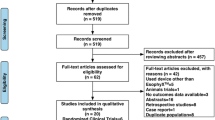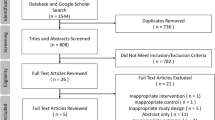Abstract
Gastroesophageal reflux disease (GERD) is a widely studied and highly prevalent condition. However, few are reported about the exact efficacy and safety of fundoplication (FPT) compared to oral intake proton-pump inhibitors (PPI). This systematic review and meta-analysis of randomized clinical trials (RCT) aims to compare PPI and FPT in relation to the efficacy, as well as the adverse events associated with these therapies. Search carried out in June 2020 was conducted on Medline, Cochrane, EMBASE and LILACS. Selection was restricted to RCT comparing PPI and FPT (open or laparoscopic) in GERD patients. Certainty of evidence and risk of bias were assessed with GRADE Pro and with Review Manager Version 5.4 bias assessment tool. Ten RCT were included. Meta-analysis showed that heartburn (RD = − 0.19; 95% CI = − 0.29, − 0.09) was less frequently reported by patients that underwent FPT. Furthermore, patients undergoing surgery had greater pressure on the lower esophageal sphincter than those who used PPI (MD = 7.81; 95% CI 4.79, 10.83). Finally, FPT did not increase significantly the risk for adverse events such as postoperative dysphagia and impaired belching. FPT is a more effective therapy than PPI treatment for GERD, without significantly increasing the risk for adverse events. However, before indicating a possible surgical approach, it is extremely important to correctly assess and select the patients who would benefit from FPT to ensure better results.




Similar content being viewed by others
References
El-Serag HB, Sweet S, Winchester CC, Dent J. Update on the epidemiology of gastro-oesophageal reflux disease: a systematic review. Gut. 2014;63(6):871–80.
Tosetti C, Savarino E, Benedetto E, De Bastiani R. Elimination of dietary triggers is successful in treating symptoms of gastroesophageal reflux disease. Dig Dis Sci. 2020. https://doi.org/10.1007/s10620-020-06414-z.
Sachs G, Shin JM, Briving C, Wallmark B, Hersey S. The pharmacology of the gastric acid pump: the H+, K+ ATPase. Annu Rev Pharmacol Toxicol. 1995;35(1):277–305.
Herszényi L, Bakucz T, Barabás L, Tulassay Z. Pharmacological approach to gastric acid suppression: past, present, and future. Dig Dis. 2020;38(Suppl. 2):104–11.
Forgacs I, Loganayagam A. Overprescribing proton pump inhibitors. BMJ. 2008;336(7634):2–3.
Seo HS, Choi M, Son S, Kim MG, Han D, Lee HH. Evidence-based practice guideline for surgical treatment of gastroesophageal reflux disease 2018. J Gastric Cancer. 2018;18(4):313.
Stefanidis D, Hope WW, Kohn GP, Reardon PR, Richardson WS, Fanelli RD, SAGES Guidelines Committee. Guidelines for surgical treatment of gastroesophageal reflux disease. Surg Endosc. 2010;24(11):2647–69. Available from https://sages.org/publications/guidelines/guidelines-for-surgical-treatment-of-gastroesophageal-reflux-disease-gerd/
Moher D, Liberati A, Tetzlaff J, Altman DG. Preferred reporting items for systematic reviews and meta-analyses: the PRISMA statement. BMJ. 2009;339(1):b2535.
University of York: Centre for Reviews and Dissemination. PROSPERO: international prospective register of systematic reviews. Available from https://crd.york.ac.uk/prospero/. Accessed Jun 2020
McMaster University (developed by Evidence Prime, Inc.). GRADEpro GDT: GRADEpro Guideline Development Tool [Software]. 2020 (cited 2020 May). Available from https://gradepro.org
Rohatgi A. WebPlotDigitizer. Version 4.3 [software]. 2019 [cited 2020 Jan]. Available from https://automeris.io/WebPlotDigitizer
The Cochrane Collaboration. Review Manager (RevMan). Version 5.4 [Computer program]. 2020 [cited 2020 Jun]. Available from https://training.cochrane.org/online-learning/core-software-cochrane-reviews/revman
Lundell L, Miettinen P, Myrvold HE, Pedersen SA, Thor K, Lamm M, et al. Long-term management of gastro-oesophageal reflux disease with omeprazole or open antireflux surgery: results of a prospective, randomized clinical trial. Eur J Gastroenterol Hepatol. 2000;12(8):879–87.
Lundell L, Miettinen P, Myrvold H, Pedersen S, Liedman B, Hatlebakk J, et al. Continued (5-year) followup of a randomized clinical study comparing antireflux surgery and omeprazole in gastroesophageal reflux disease. J Am Coll Surg. 2001;192(2):172–9.
Lundell L, Miettinen P, Myrvold HE, Hatlebakk JG, Wallin L, Malm A, et al. Seven-year follow-up of a randomized clinical trial comparing proton-pump inhibition with surgical therapy for reflux oesophagitis. Br J Surg. 2007;94(2):198–203. https://doi.org/10.1002/bjs.5492.
Anvari M, Allen C, Marshall J, Armstrong D, Goeree R, Ungar W, et al. A randomized controlled trial of laparoscopic Nissen fundoplication versus proton pump inhibitors for treatment of patients with chronic gastroesophageal reflux disease: one-year follow-up. Surg Innov. 2006;13(4):238–49.
Anvari M, Allen C, Marshall J, Armstrong D, Goeree R, Ungar W, et al. A randomized controlled trial of laparoscopic Nissen fundoplication versus proton pump inhibitors for the treatment of patients with chronic gastroesophageal reflux disease (GERD): 3-year outcomes. Surg Endosc. 2011;25(8):2547–54.
Mahon D, Rhodes M, Decadt B, Hindmarsh A, Lowndes R, Beckingham I, et al. Randomized clinical trial of laparoscopic Nissen fundoplication compared with proton-pump inhibitors for treatment of chronic gastro-oesophageal reflux. Br J Surg. 2005;92(6):695–9.
Lundell L, Attwood S, Ell C, Fiocca R, Galmiche J, Hatlebakk J, et al. Comparing laparoscopic antireflux surgery with esomeprazole in the management of patients with chronic gastro-oesophageal reflux disease: a 3-year interim analysis of the LOTUS trial. Gut. 2008;57(9):1207–13.
Grant AM, Cotton SC, Boachie C, Ramsay CR, Krukowski ZH, Heading RC, et al. Minimal access surgery compared with medical management for gastro-oesophageal reflux disease: five year follow-up of a randomised controlled trial (REFLUX). BMJ. 2013;346(2):f1908.
Mehta S, Bennett J, Mahon D, Rhodes M. Prospective trial of laparoscopic Nissen fundoplication versus proton pump inhibitor therapy for gastroesophageal reflux disease: seven-year follow-up. J Gastrointest Surg. 2006;10(9):1312–7.
Lundell L, Miettinen P, Myrvold HE, Hatlebakk JG, Wallin L, Engström C, et al. Comparison of outcomes twelve years after antireflux surgery or omeprazole maintenance therapy for reflux esophagitis. Clin Gastroenterol Hepatol. 2009;7(12):1292–8.
Mikami DJ, Murayama KM. Physiology and pathogenesis of gastroesophageal reflux disease. Surg Clin North Am. 2015;95(3):515–25.
Hemmink GJ, Bredenoord AJ, Weusten BL, Monkelbaan JF, Timmer R, Smout AJ. Esophageal pH-impedance monitoring in patients with therapy-resistant reflux symptoms: ‘on’ or ‘off’ proton pump inhibitor? Am J Gastroenterol. 2008;103(10):2446–53.
Tutuian R, Castell DO. Use of multichannel intraluminal impedance to document proximal esophageal and pharyngeal nonacidic reflux episodes. Am J Med. 2003;115(3):119–23.
Shin JM, Sachs G. Pharmacology of proton pump inhibitors. Curr Gastroenterol Rep. 2008;10(6):528–34.
Fass R. Erosive esophagitis and nonerosive reflux disease (NERD). J Clin Gastroenterol. 2007;41(2):131–7.
Park J, Chi K. Antireflux surgery is equally beneficial in nonerosive and erosive gastroesophageal reflux disease. Ann Surg Treat Res. 2018;95(2):94.
Tustumi F, Bernardo WM, Mariano da Rocha JR, Szachnowicz S, Bernal da Costa Seguro FC, Bianchi ET, et al. Anti-reflux surgery for controlling respiratory symptoms of gastro-esophageal reflux disease: a systematic review and meta-analysis. Asian J Surg. 2020. https://doi.org/10.1016/j.asjsur.2020.04.017.
Bortoli N, Gyawali CP, Frazzoni M, Tolone S, Frazzoni L, Vichi E, et al. Bile reflux in patients with nerd is associated with more severe heartburn and lower values of mean nocturnal baseline impedance and chemical clearance. Neurogastroenterol Motil. 2020. https://doi.org/10.1111/nmo.13919.
Hainaux B, Sattari A, Coppens E, Sadeghi N, Cadière G. Intrathoracic migration of the wrap after laparoscopic Nissen fundoplication. Am J Roentgenol. 2002;178(4):859–62.
Deswysen Y, Volonte F, Gutschow C, Romagnoli R, Strignano P, Ouazzani A, et al. Herniation of an abdominal antireflux fundoplication into the chest: what does it mean? Eur J Cardiothorac Surg. 2014;46(1):121–6.
Khajanchee YS. Laparoscopic reintervention for failed antireflux surgery. Arch Surg. 2007;142(8):785.
Granderath FA. Laparoscopic Nissen fundoplication with prosthetic hiatal closure reduces postoperative intrathoracic wrap herniation. Arch Surg. 2005;140(1):40.
Broeders JA, Mauritz FA, Ahmed Ali U, Draaisma WA, Ruurda JP, Gooszen HG, et al. Systematic review and meta-analysis of laparoscopic Nissen (posterior total) versus Toupet (posterior partial) fundoplication for gastro-oesophageal reflux disease. Br J Surg. 2010;97(9):1318–30.
Hajibandeh S, Hajibandeh S, Pugh M, Winters D, Hobbs N, Tarazi M, et al. Impact of Toupet versus Nissen fundoplication on dysphagia in patients with gastroesophageal reflux disease and associated preoperative esophageal dysmotility: a systematic review and meta-analysis. Surg Innov. 2018. https://doi.org/10.1177/1553350618799549.
Andreou A, Watson DI, Mavridis D, Francis NK, Antoniou SA. Assessing the efficacy and safety of laparoscopic antireflux procedures for the management of gastroesophageal reflux disease: a systematic review with network meta-analysis. Surg Endosc. 2020;34(2):510–20.
Tian ZC, Wang B, Shan CX, Zhang W, Jiang DZ, Qiu M. A meta-analysis of randomized controlled trials to compare long-term outcomes of Nissen and Toupet fundoplication for gastroesophageal reflux disease. PLoS ONE. 2015;10(6):e0127627.
Miyazaki H, Igarashi A, Takeuchi T, Teng L, Uda A, Deguchi H, et al. Vonoprazan versus proton-pump inhibitors for healing gastroesophageal reflux disease: a systematic review. J Gastroenterol Hepatol. 2019;34(8):1316–28.
Islam M, Poly TN, Walther BA, Dubey NK, Anggraini Ningrum DN, Shabbir S, et al. Adverse outcomes of long-term use of proton pump inhibitors. Eur J Gastroenterol Hepatol. 2018;30(12):1395–405.
Ngamruengphong S, Leontiadis GI, Radhi S, Dentino A, Nugent K. Proton pump inhibitors and risk of fracture: a systematic review and meta-analysis of observational studies. Am J Gastroenterol. 2011;106(7):1209–18.
Hess MW, Hoenderop JGJ, Bindels RJM, Drenth JPH. Systematic review: hypomagnesaemia induced by proton pump inhibition. Aliment Pharmacol Ther. 2012;36(5):405–13.
Acknowledgements
LST received a research award from Brazil’s Conselho Nacional de Desenvolvimento Científico e Tecnológico (CNPq) (Grant Number 155512/2019-6).
Author information
Authors and Affiliations
Corresponding author
Ethics declarations
Ethical Statement
This article does not contain any studies with human or animal subjects performed by any of the authors.
Conflict of interest
LST reports grants from Conselho Nacional de Desenvolvimento Científico e Tecnológico (CNPq), during the conduct of the study. The other authors declare that they have no conflict of interest.
Additional information
Publisher's Note
Springer Nature remains neutral with regard to jurisdictional claims in published maps and institutional affiliations.
Supplementary information
Below is the link to the electronic supplementary material.
Rights and permissions
About this article
Cite this article
Tristão, L.S., Tustumi, F., Tavares, G. et al. Fundoplication versus oral proton pump inhibitors for gastroesophageal reflux disease: a systematic review and meta-analysis of randomized clinical trials. Esophagus 18, 173–180 (2021). https://doi.org/10.1007/s10388-020-00806-w
Received:
Accepted:
Published:
Issue Date:
DOI: https://doi.org/10.1007/s10388-020-00806-w




